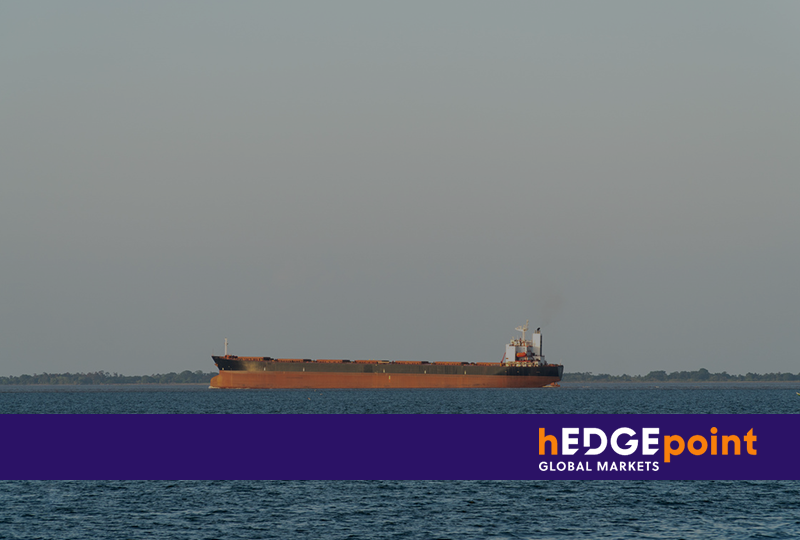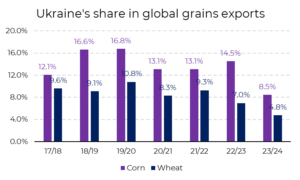
Commodity markets are directly impacted by the political and economic decisions of countries around the world. When a major conflict occurs, like what’s be

Commodity markets are directly impacted by the political and economic decisions of countries around the world. When a major conflict occurs, like what’s been going on between Russia and Ukraine since February of 2022, the production and distribution of agricultural goods can be seriously affected, putting food security at risk. This was the context in which the Grain Corridor was created, and it’s just been renewed for another 60 days.
The two countries that continue at war are major commodity producers, mainly of wheat, cereals, oil, and natural gas. At the beginning of the conflict, speculations had already caused concern over price increases and the possible lack of wheat worldwide, and natural gas, mainly in Europe.
The impacts of this agreement were positive, both for the countries, which were able to maintain their exports, and for the rest of the world, which can be more reassured due to lesser inflation as well as possible shortages of these products. In this text, we’ll look a bit more at what the Grain Corridor is and how it works.
The Black Sea Grain Corridor was established on July 22, 2022, as a collaborative effort between Russia and Ukraine, despite the fact the two countries have been at war since February 2022. The United Nations (UN) and Turkey also gave their support to the initiative, allowing Ukraine to resume its exports.
Ukraine used to export 6 million tons of wheat a month while at peace, according to the Ukrainian culture minister, Mykola Solskyi. However, when the war started, a large amount was stored as stock, without any possibility of leaving the country, thus harming the local economy, while impacting the global economy and putting world food security at risk.
Faced with this situation, the UN mediated an agreement between Ukraine and Russia, supported by Turkey, called the Black Sea Grain Initiative. The official ceremony took place in Istanbul, a neutral city outside the conflict.
This agreement made it possible again to export grain, other foodstuffs, and fertilizers from three important ports in Ukraine to the rest of the world. The vessels that pass through the corridor must be inspected in Istanbul, to guarantee the safety of the operation.
The route is 320 nautical miles long and connects three key Ukrainian ports – Odesa, Chornomorsk, and Yuzhny – with inspection areas located in Turkish territorial waters.
Ukraine is currently exporting about 15% of the world’s maize and 7% of its wheat, making it extremely important for global food security. Of these totals, 22% are destined for middle and low-income countries, according to the JCC (an acronym for the Joint Coordination Center, a team made up of representatives of the three countries and the UN).

With the corridor active, total Ukrainian shipments of wheat, corn, and barley could reach 6 million tons per month. When the corridor’s closed, and transport must go by rail only, this number drops to just 2 million.
The agreement, which was established with a period of 120 days to be reviewed, has now reached its third renewal round. Since it was initially signed, 953 ships, carrying 30 million tons of food to 45 countries, have sailed.
This month, the Grain Corridor Agreement was extended again, valid for another 60 days. Though the extension exerts downward pressure on wheat and corn prices in the short term, next-crop exports remain at risk.
Even so, from Russia’s point of view, the possible non-extension of the Grain Corridor Agreement in July seems unattractive as it could lead to retaliation by Western countries, hurting Russia’s export potential.
As a result, the agreement’s non-extension would have a major impact on wheat markets, as it would affect two of the largest exporters in the world and their exports in a scenario of already tight global inventories. The same doesn’t apply so much to corn, given the greater supply expected for the next harvest in several regions, including Europe.
Esse cenário é um bom exemplo que não nos deixa dúvidas: o mercado de commodities é muito volátil. Mesmo quando não está sendo impactado por um conflito internacional, o cenário político e econômico do Brasil e do exterior influenciam na formação de preço. Assim como as taxas de câmbio, que também podem variar.
This scenario is an example that leaves no doubt: commodity markets are very volatile. Even when they’re not impacted by any international conflict, political and economic situations in Brazil and abroad influence price formation (as well as exchange rates, which also vary greatly).
That is why it’s essential to plan in order to provide more predictability and security for the future of your business. Using hedging strategies is the best option to avoid unpleasant surprises in the financial planning of those who work in the commodity chain.
hEDGEpoint puts together the knowledge of specialists with risk management products through technology and customized consulting to always offer you the best experience in futures operations.
We’re globally present and always prepared to serve you, at any time and in any place. Get in touch with us to learn more about how to use this instrument to favor your business.

Rua Funchal, 418, 18º andar - Vila Olímpia São Paulo, SP, Brasil
Contato
(00) 99999-8888 example@mail.com
Section
Home
O que Fazemos
Mercado
Quem Somos
HUB
Blog
Esta página foi preparada pela Hedgepoint Schweiz AG e suas afiliadas (“Hedgepoint”) exclusivamente para fins informativos e instrutivos, sem o objetivo de estabelecer obrigações ou compromissos com terceiros, nem de promover uma oferta ou solicitação de oferta de venda ou compra de quaisquer valores mobiliários, commodity interests ou produtos de investimento.
A Hedgepoint e suas associadas renunciam expressamente a qualquer uso das informações contidas neste documento que direta ou indiretamente resulte em danos ou prejuízos de qualquer natureza. As informações são obtidas de fontes que acreditamos serem confiáveis, mas não garantimos a atualidade ou precisão dessas informações.
O trading de commodity interests, como futuros, opções e swaps, envolve um risco substancial de perda e pode não ser adequado para todos os investidores. Você deve considerar cuidadosamente se esse tipo de negociação é adequado para você, levando em conta sua situação financeira. O desempenho passado não é necessariamente indicativo de resultados futuros. Os clientes devem confiar em seu próprio julgamento independente e/ou consultores antes de realizar qualquer transação.
A Hedgepoint não fornece consultoria jurídica, tributária ou contábil, sendo de sua responsabilidade buscar essas orientações separadamente.
A Hedgepoint Schweiz AG está organizada, constituída e existente sob as leis da Suíça, é afiliada à ARIF, a Associação Romande des Intermédiaires Financiers, que é uma Organização de Autorregulação autorizada pela FINMA. A Hedgepoint Commodities LLC está organizada, constituída e existente sob as leis dos Estados Unidos, sendo autorizada e regulada pela Commodity Futures Trading Commission (CFTC) e é membro da National Futures Association (NFA), atuando como Introducing Broker e Commodity Trading Advisor. A Hedgepoint Global Markets Limited é regulada pela Dubai Financial Services Authority. O conteúdo é direcionado a Clientes Profissionais e não a Clientes de Varejo. A Hedgepoint Global Markets PTE. Ltd está organizada, constituída e existente sob as leis de Singapura, isenta de obter uma licença de serviços financeiros conforme o Segundo Anexo do Securities and Futures (Licensing and Conduct of Business) Act, pela Monetary Authority of Singapore (MAS). A Hedgepoint Global Markets DTVM Ltda. é autorizada e regulada no Brasil pelo Banco Central do Brasil (BCB) e pela Comissão de Valores Mobiliários (CVM). A Hedgepoint Serviços Ltda. está organizada, constituída e existente sob as leis do Brasil. A Hedgepoint Global Markets S.A. está organizada, constituída e existente sob as leis do Uruguai.
Em caso de dúvidas não resolvidas no primeiro contato com o atendimento ao cliente (client.services@hedgepointglobal.com), entre em contato com o canal de ouvidoria interna (ombudsman@hedgepointglobal.com – global ou ouvidoria@hedgepointglobal.com – apenas Brasil) ou ligue para 0800-8788408 (apenas Brasil).
Integridade, ética e transparência são valores que guiam nossa cultura. Para fortalecer ainda mais nossas práticas, a Hedgepoint possui um canal de denúncias para colaboradores e terceiros via e-mail ethicline@hedgepointglobal.com ou pelo formulário Ethic Line – Hedgepoint Global Markets.
Nota de segurança: Todos os contatos com clientes e parceiros são realizados exclusivamente por meio do nosso domínio @hedgepointglobal.com. Não aceite informações, boletos, extratos ou solicitações de outros domínios e preste atenção especial a variações em letras ou grafias, pois podem indicar uma situação fraudulenta.
“Hedgepoint” e o logotipo “Hedgepoint” são marcas de uso exclusivo da Hedgepoint e/ou de suas afiliadas. O uso ou reprodução é proibido, a menos que expressamente autorizado pela HedgePoint.
Além disso, o uso de outras marcas neste documento foi autorizado apenas para fins de identificação. Isso, portanto, não implica quaisquer direitos da HedgePoint sobre essas marcas ou implica endosso, associação ou aprovação pelos proprietários dessas marcas com a Hedgepoint ou suas afiliadas.
aA Hedgepoint Global Markets é correspondente cambial do Ebury Banco de Câmbio, de acordo com a resolução CMN Nº 4.935, DE 29 DE JULHO DE 2021, Artigo 14 do Banco Central do Brasil (BACEN).
Para mais informações sobre nosso parceiro, serviços disponíveis, atendimento e ouvidoria, acesse o link a seguir: https://br.ebury.com/